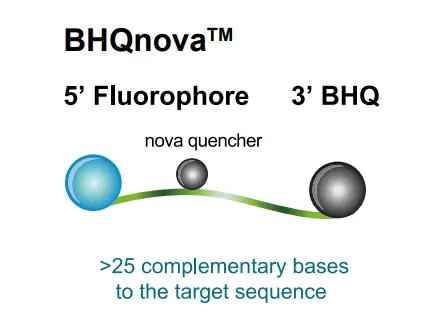
BHQnova Probes
BHQnova Probes
Double-quenched BHQnova Probes
BHQnova™ Probes are a double-quenched probe format that improves quenching efficiency and signal release. This quencher configuration is particularly suited to longer probes sequences, typically 25 bases or longer, which otherwise may suffer from poor quenching efficiency as traditional end-labeled probes.
What distinguishes BHQnova probes is the incorporation of the new internal “Nova” quencher between base residues 9 & 10. The system of dye modifications and their precise position within the strand improves assay function for qPCR applications such as gene expression analysis, copy number variation, and infectious disease detection.

The internal Nova quencher improves the signal-to-noise ratio of longer probe sequences, as may be necessary to achieve the proper melting temperature, or TM. The double-quenched configuration overcomes the upper limit on sequence length, to achieve robust amplification curves irrespective of base composition. Now probes can be targeted to AT-rich regions without sacrificing their performance characteristics.

Figure 1. qPCR amplification curves comparing a BHQnova probe (red) and a standard end-labeled probe (black) of the same 35-base sequence. The BHQnova probe reveals improved quenching efficiency in the raw data at left, before baseline subtraction. The normalized amplification data at right better illustrates the dramatic improvement in signal response.